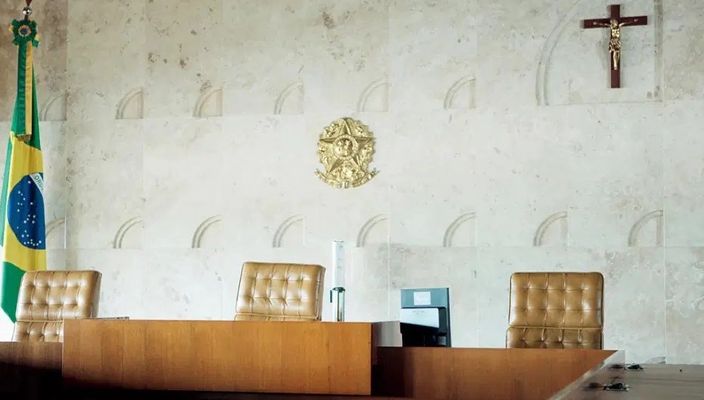REFERÊNCIAS
BRASIL. Regimento Interno do Supremo Tribunal Federal (RISTF). Disponível em: <https://www.stf.jus.br/arquivo/cms/legislacaoRegimentoInterno/anexo/RISTF.pdf>. Acesso em: 10 mar. 2024.
BRASIL. Decisão. Inquérito 4781 Distrito Federal. Disponível em: <https://www.stf.jus.br/arquivo/cms/noticiaNoticiaStf/anexo/mandado27maio.pdf>. Acesso em: 23 mar. 2024.
BRASIL. Lei nº 12.830, de 20 de junho de 2013. Dispõe sobre a investigação criminal conduzida pelo delegado de polícia. Disponível em: <https://www.planalto.gov.br/ccivil_03/_ato2011-2014/2013/lei/l12830.htm>. Acesso em: 2 mar. 2024.
BRASIL. Lei nº Lei 13.964, de 24 de dezembro de 2019. Aperfeiçoa a legislação penal e processual penal. Disponível em: <https://www.planalto.gov.br/ccivil_03/_ato2019-2022/2019/lei/l13964.htm>. Acesso em: 5 mar. 2024.
BRASIL. Lei nº 3.689, de 3 de outubro de 1941. Código de Processo Penal. Disponível em: <https://www.planalto.gov.br/ccivil_03/decreto-lei/del3689.htm?origin=instituicao>. Acesso em: 4 mar. 2024.
CAPEZ, Fernando. Curso de Processo Penal. 25. ed. São Paulo: Saraiva Educação, 2018.
CAPEZ, Fernando. Sistema acusatório e garantias do processo penal. Disponível em: <https://www.conjur.com.br/2021-out-07/controversias-juridicas-sistema-acusatorio-garantias-processo-penal/>. Acesso em: 14 mar. 2024.
CONGRESSO EM FOCO. Mandado de Segurança nº 36422. Disponível em: <https://static.congressoemfoco.uol.com.br/2019/08/Manifestacao.pdf>. Acesso em: 20 abr. 2024.
CONSULTOR JURÍDICO. Portaria GP Nº 69 de 14 de março de 2019. Disponível em: <https://www.conjur.com.br/dl/co/comunicado-supremo-tribunal-federal1.pdf>. Acesso em: 11 abr. 2024.
JUSBRASIL. A Análise De Legalidade Do Inquérito Das "Fake News" Do Supremo Tribunal Federal. Disponível em: <https://www.jusbrasil.com.br/artigos/a-analise-de-legalidade-do-inquerito-das-fake-news-do-supremo-tribunal-federal/1837177218>. Acesso em: 1 abr. 2024.
LOPES JR. Aury. Direito processual penal. São Paulo: Saraiva Educação, 2019, p. 45.
NETO, Horígenes Fontes Soares; DOS SANTOS, Tales Rosa. IMPARCIALIDADE DO JUIZ NA REQUISIÇÃO DE ABERTURA DE INQUÉRITOS POLICIAIS: ENSAIO SOBRE A NÃO RECEPÇÃO DO ARTIGO 5º, II, DO CÓDIGO DE PROCESSO PENAL BRASILEIRO PELA ORDEM CONSTITUCIONAL. Disponível em: <https://sistemas.uft.edu.br/periodicos/index.php/direito/article/view/12922/20180>. Acesso em: 3 abr. 2024.
LOPES JÚNIOR. Direito Processual Penal. Editora Saraiva: São Paulo, 2020.
SUPERIOR TRIBUNAL DE JUSTIÇA (STJ). Habeas Corpus. Decisão monocrática. 2021. Relatora Min. Laurita Vaz. Disponível em: <https://www.jusbrasil.com.br/jurisprudencia/stj/1171895623/decisao-monocratica-1171895716>. Acesso em: 6 mar. 2024.
SUPREMO TRIBUNAL FEDERAL. Arguição de Descumprimento de Preceito Fundamental 572. Acórdão. De 18 de junho de 2020. Disponível em: <https://redir.stf.jus.br/paginadorpub/paginador.jsp?docTP=TP&docID=754371407%20>. Acesso em: 30 abr. 2024.
YOU TUBE. No Roda Viva, Raquel Dodge comenta inquérito das fake news. 22. de ago. De 2022. Disponível em: <https://www.youtube.com/watch?v=Hs71k1EFMJY>. Acesso em: 1 mai. 2024.
Abstract: This scientific research was carried out under the pretext of raising questionable items, mainly regarding injuries to the Accusatory Principle, in Inquiry 4781/DF, the so-called “Fake News Inquiry”. The investigative procedure object of this article is the result of the Federal Supreme Court's understanding that attacks on its members, within the scope of social networks, fall within what article 43 of the Internal Regulations of the Supreme Court describes as “seat or dependency of the Court”, once the offenses uttered against the members of the Colendo STF were classified as a crime, and, therefore, led to the opening of the investigation within the Collegiate Body itself. This scientific piece analyzed topics that raise suspicion of violation of the Accusatory system, taking into account some bottlenecks present in the procedure, such as the opening of the investigation by those who appear as victims, the conduct of it precisely by those who initiated it and its future processing in the same House, that is, an offense against the maxim of criminal proceduralism of the separation of the accusing and judging bodies. In this sense, the methodology used to uncover the incidence, or not, of defects was the analysis of doctrines consistent with the theme and jurisprudence of the Federal Supreme Court and Superior Courts.
Key words: Accusatory. Inquisitive. STF. Fake News. Inquiry.




